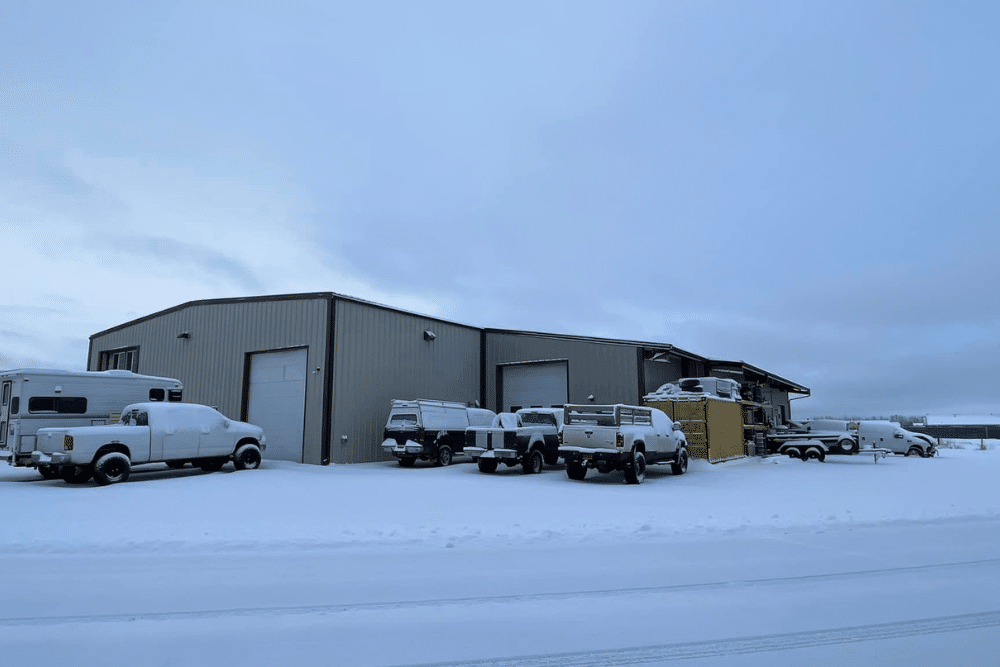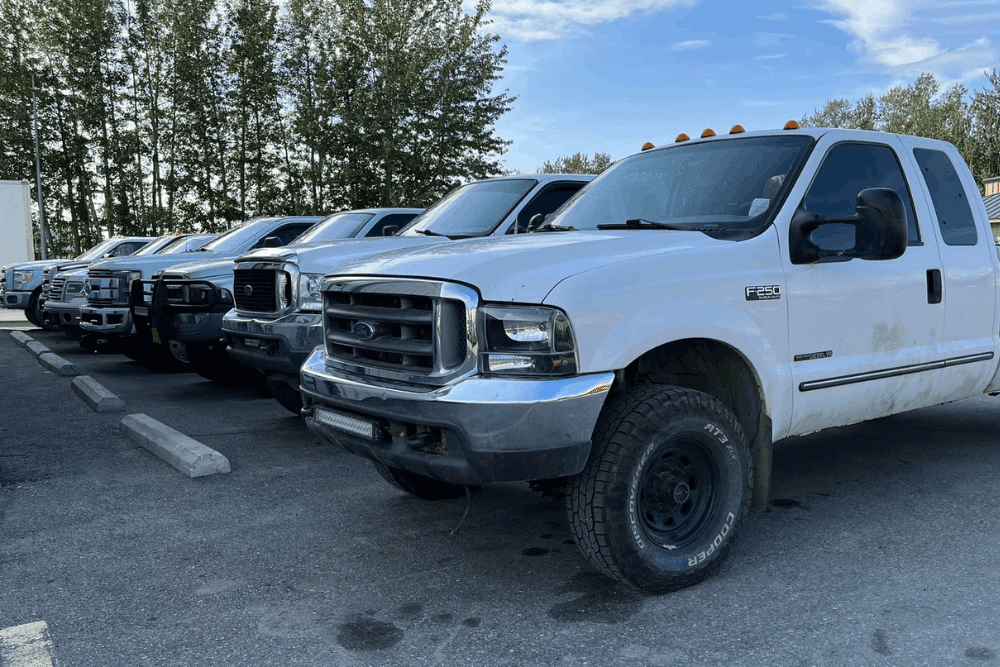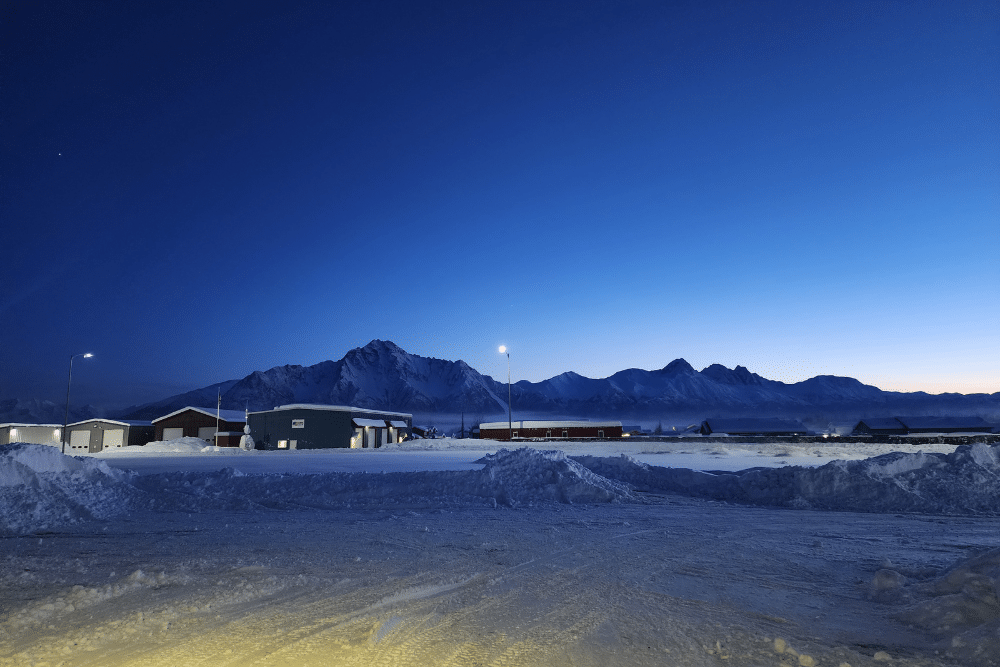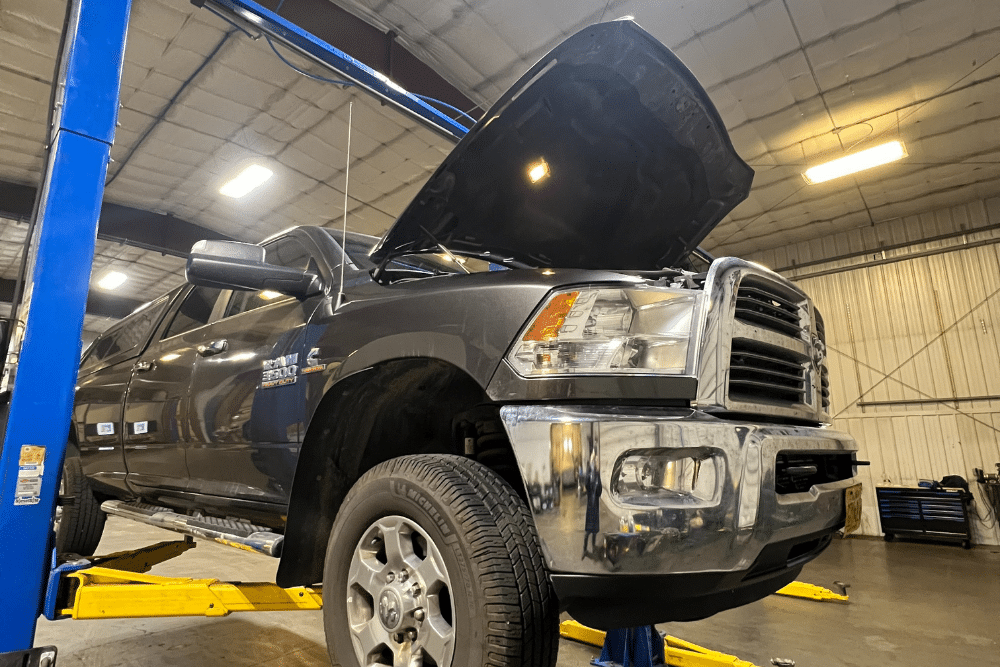When winter sets in across Alaska, diesel truck owners face a different kind of challenge. Cold-weather diesel starting issues are all too common, whether it’s white smoke, slow cranking, or complete diesel no-starts in Alaska’s subzero climate.
As temperatures drop, oil thickens, batteries lose strength, glow plugs work harder, and diesel fuel thickens until it restricts flow. Without the right prep, diesel starting problems in cold weather can leave even a reliable truck stuck in the driveway.
At 1023 Diesel & Fleet in Palmer, AK, we specialize in keeping trucks dependable through every stage of winter. From testing glow plugs to solving fuel flow problems in the cold, our winter diesel services are built with the Alaskan driver in mind.
Diesel vs. Alaska Winters: Why Starting Gets Tough
Gas engines use spark plugs, but diesel engines depend on compression and heat. When the weather is mild, this works perfectly. But in the bitter cold, compression alone struggles to generate the heat needed to ignite fuel. This is why diesel cold starts can become unpredictable.
Here’s what contributes to winter diesel starting issues:
- Engine turnover speed slows down, reducing the heat generated inside the cylinders
- Diesel fuel thickens and can clog lines or filters, causing fuel flow problems in cold conditions
- Glow plugs and intake heaters wear out or underperform when they are most needed
- A weak battery or starter system reduces cranking power, leaving your engine without enough momentum to start
If your truck refuses to start without being plugged in at relatively moderate winter temperatures, there may be a deeper issue. Proper maintenance can help a diesel engine start reliably, even when it’s well below zero.
Diesel Life in the Last Frontier: Cold Weather Realities
In Palmer, Wasilla, Anchorage, and the surrounding areas, diesel trucks are more than transportation. They are tools for towing, hauling, and navigating remote terrain in freezing conditions. Diesel cold start problems in Alaska are not just an inconvenience; they can be the difference between getting to work or being stuck in the garage.
When diesel fuel isn’t pressurized properly or glow plugs can’t heat the cylinders, the truck won’t start. Alaskan diesel drivers must prepare for the extremes. A dependable truck starts with understanding what it needs to survive these conditions.
The Most Common Diesel Starting Issues in Winter
Some issues don’t show up until it’s cold enough to matter. These are the most frequent diesel cold start problems we see each winter.
Glow Plug and Heater Failures
Glow plugs and grid heaters preheat the combustion chamber. If they fail, the engine can’t generate enough heat to ignite fuel. Ford trucks often deal with glow plug module problems, Duramax trucks may have faulty controllers, and Cummins engines rely on grid heaters that frequently fail. Regular glow plug service is one of the most important parts of winter prep.
Slow Cranking and Weak Batteries
The faster your engine turns over, the more heat is generated. Cold temperatures reveal battery and starter problems quickly. If your truck cranks slowly or feels sluggish, chances are you’re dealing with a weak battery or starter problems in winter.
Diesel Fuel Thickening and Frozen Fuel Lines
Diesel fuel thickens in extreme cold, especially if the wrong blend is used or anti-gel treatments are skipped. Thickened fuel and frozen lines prevent proper fuel delivery, often causing no-starts. Preventing fuel flow problems in cold weather starts with the right winter treatment.
Heavy Oil in Cold Weather
Cold-weather engine oil makes a huge difference. If the oil is too thick, it forces the starter to work harder, reducing engine turnover speed and stressing internal components. Switching to a winter-grade synthetic oil helps the engine turn over more easily and start faster.
Why Engine Turnover Speed Matters More Than You Think
Engine turnover speed, or how fast the starter moves the piston, is one of the most important but overlooked parts of winter diesel starting. Faster engine cranking builds more heat in the combustion chamber and allows fuel to atomize more effectively.
If you’re depending on a block heater at just 20°F, there may be an underlying issue like poor compression, worn glow plugs, or a tired starter. Solving the root problem keeps your truck dependable all winter long.
The Overlooked Details Behind Diesel Cold Start Problems
Alaska drivers often rely on habits like plugging in block heaters, adding fuel treatments, or letting engines idle longer. These help, but they don’t replace maintenance. Here are some of the real problems behind winter diesel no-starts:
- Cylinder compression must be strong enough to trap and heat the air. Even small losses make cold starts harder.
- Electrical connections that seem fine in summer can fail when temperatures drop. Loose or corroded connections cause voltage loss.
- Maintenance is better than band-aids. Battery blankets and oil pan heaters are helpful, but they won’t fix a weak starter or bad glow plugs.
Focus on foundational repairs and testing, not temporary add-ons.
Cold Weather Diesel Maintenance Checklist
Winter preparation prevents downtime. If your diesel hasn’t had a thorough check-up this year, here’s what to ask for:
- Testing glow plugs, relays, and grid heaters
- Checking battery load capacity and replacing it if needed
- Evaluating starter performance and crank speed
- Using synthetic winter-grade oil
- Replacing fuel filters and treating for fuel thickening
- Cleaning and tightening all electrical connections
Schedule this service before winter gets serious. Cold diesel starting problems don’t fix themselves.
Brand-Specific Winter Starting Issues
Each diesel truck has its own weak points:
- Ford: Glow plug relays and weak batteries are common Ford diesel cold start problems in Alaska.
- Ram (Cummins): Grid heaters often fail, especially in extreme cold.
- Chevy/GMC (Duramax): Faulty modules and leaking fuel filter housings are top contributors to winter diesel starting issues.
Our team at 1023 Diesel & Fleet is trained to identify and fix these problems across Ford, Dodge, and GM platforms.
Ask These Mid-Winter Readiness Questions
Before the season worsens, ask yourself:
- Does my truck crank slowly, or need multiple tries to start?
- Have my glow plugs or heaters been tested?
- Are my batteries strong enough for deep cold starts?
- Am I using the correct oil for Alaska winters?
- Do I have anti-gel fuel treatments ready?
If any answer is no, book a cold-start inspection today.
Why Alaskans Choose 1023 Diesel & Fleet
We’re not just diesel mechanics. We live here too. We understand how long winters test your truck’s limits, and we’re equipped to fix what others miss.
- ASE Master Certified technicians
- Factory-trained for Ford, Dodge, and GM
- Full diesel service, including transmissions, fuel systems, and general repairs
- 2-year/24,000-mile warranty on repairs
Based in Palmer, we also serve Wasilla, Anchorage, and the Mat-Su Valley. Our wait times are shorter than most dealerships, and we specialize in light-duty diesel trucks.
Cold Weather Diesel Starting FAQs for Alaska Truck Owners
Why does my diesel take longer to warm up?
Diesels are more efficient at holding heat, but take longer to build it. That’s why cabin heat and defrost functions can lag in the cold.
Can starting my diesel repeatedly in cold weather cause damage?
Yes. Repeated attempts can overheat your starter, drain your battery, and flood the engine with unburned fuel. If it won’t start after a few tries, stop and investigate the cause.
Is it safe to use starting fluid on my diesel?
Not recommended. Starting fluid can damage engines with glow plugs or intake heaters. Rely on proper maintenance, not risky quick-fixes.
What temperature is too cold for a diesel to start?
A well-maintained diesel can start reliably at -20°F. If your truck struggles above that, it likely has compression, glow plug, or starter issues.
Should I keep my diesel plugged in all winter?
Use your block heater during extremely cold nights, but if your truck can’t start without it at 20°F, it’s time for a professional inspection.
Prevent No-Start Headaches: Diesel Cold Weather Service in Palmer, AK
At 1023 Diesel & Fleet, we help Alaskans keep their trucks dependable during the toughest months. Whether you need glow plug repairs, fuel system service, or a full cold-weather inspection, we’re here for you.
Visit us at 530 E Steel Loop, Palmer, AK 99645. Call 907-414-8592 or schedule online. Stay ready this winter with expert diesel service you can trust.




